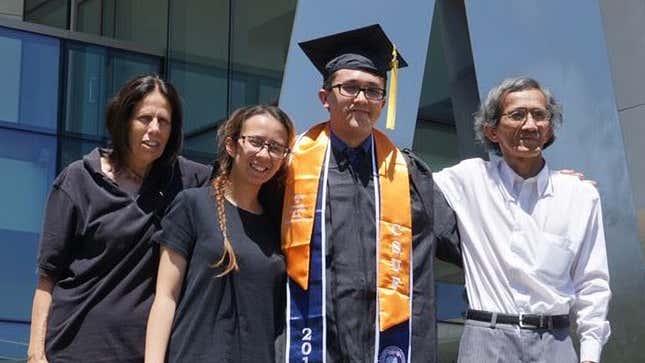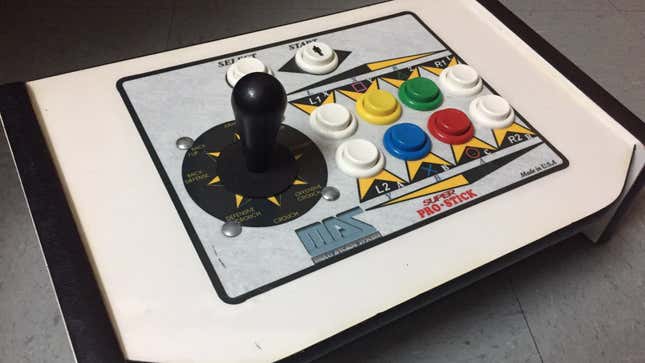
In the early hours of March 29, an accidental, cooking-related fire in Westminster, California claimed the life of 63-year-old Reynalda Lynn Nguyen. Her husband, Thao Nguyen, survived for two weeks in critical condition before also passing away on April 13. They leave behind two children, Anthony and Alexandria Kristen Nguyen, who are accepting donations so they can afford to bury their parents.
You may not know the Nguyens by name, but if you’re at all familiar with fighting games, you might be aware of their legacy. They were the creators of the Multi Arcade System joystick, or MAS for short, a monumental piece of hardware that helped transform the way fighting games were played. As the United States shifted away from arcades in favor of home consoles, the Nguyens’ made-to-order arcade sticks supported the competitive fighting game community in an increasingly indifferent gaming culture.
While these days anyone with a couple hundred bucks can grab a decent arcade stick from companies like Mad Catz, Razer, or Qanba, that wasn’t the case for American players in the ‘90s and early aughts. And even if you did have the time and money to import a controller from Japan, what you received would be a far cry from what you were used to in arcades, both in terms of parts used and overall build caliber. Back then, American players were still more comfortable with the elongated bat-top joysticks common in the west—this was long before the proliferation of the now-standard, Japanese-style ball-tops—and early manufacturers were still figuring out how to produce quality controllers for the mass market.

That’s what made MAS so special to fighting game players in the United States. The family’s massive, weighty, multi-system controllers—these beauties were meant for setting on floors or tables, not human laps—almost perfectly replicated the U.S. arcade experience, allowing players to practice at home and, when the scene began moving exclusively to consoles, participate at prestigious tournaments like the Evolution Championship Series without resorting to playing on a lowly Dreamcast or PlayStation pad. It was a revolutionary concept at the time that paved the way for the widely produced arcade sticks we know today and modern fighting game competition in general.
“I joke that, at the time, it felt like you were like going to the secret blacksmith who forges your weapon when you get inducted into the fighting game community,” Timberline Studio programmer and designer Nathaniel Chapman told Kotaku via private message. “Reynalda was usually watching their kids in the back while Thao was working. Thao loved to talk with you while he was working, and in my experience, a lot of what he talked about was about how shitty other controllers were. He was obsessed with quality; he hand-soldered everything and had several consoles running by his workstation to test inputs before he gave you back your stick.”
After learning of Thao and Reynalda Lynn’s passing, social media was flooded with now-bittersweet memories of the impact the Nguyens made on fighting games in both casual play and serious competition. Many were from folks who still participate in the fighting game community but have also gone on to establish themselves as game developers.
“If I didn’t get a MAS stick, where would I be? Would I still be playing fighting games?” fighting game legend Justin Wong said on his Twitch stream while raising money for the Nguyen family earlier this week. He also mentioned that he was using a MAS during his infamous Evo 2004 match with Daigo Umehara, which has since become one of the most important moments in fighting game history.
“Thank you for helping shape our community,” said Mark Julio, an integral member of the fighting game community who helped Mad Catz enter the arcade stick market around the release of Street Fighter IV in 2009.
“Thao and Lynn are absolute legends of the fighting game community,” longtime competitor Scott “SaBrE” Bender wrote on Twitter.
“[Thao’s] passion in creating arcade-perfect fight sticks in the ‘90s is how the early fighting game community was able to train at home,” added Alex Valle, a Southern California tournament organizer and fighting game veteran Alex Valle added who referred to Thao as “the original FGC blacksmith.”
Patrick Miller, another old-timer who is currently working on a League of Legends fighting game at Riot Games, wrote that MAS arcade sticks “defined an early era of at-home fighting games.”
Supergiant Games creative director Greg Kasavin left an especially touching comment on the family’s donation page. “When I first came into contact with [the Nguyens’] work, I was just some miserable teen who could never hope to explain to a normal person just how significant of a thing a MAS Systems stick was,” the Hades writer said. “These remain some of the best things I’ve ever paid for. I remember thinking Thao and Lynn were true artists, creating these genuine pieces of the arcade experience that people like me could have at home.”
A common sentiment among those remembering the departed is the hope that Thao and Reynalda Lynn understood just how important their work was to the various people who made up (and still make up) the fighting game community. As Justin Wong noted, he might not even be around today if a MAS controller hadn’t eased his transition from arcade to home console competition. Thao, Reynalda Lynn, and the small business they cultivated in Southern California touched so many lives that their memory will live on in the hearts of fighting game players and the passion of the competitive community forever.
Thank you, Thao and Reynalda Lynn, for every button press, every pop-off, every salty runback of the last two decades. Rest in peace.
.